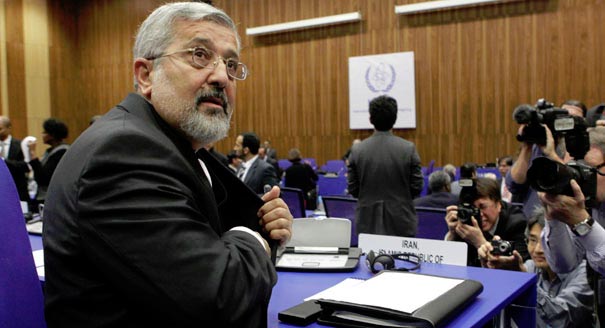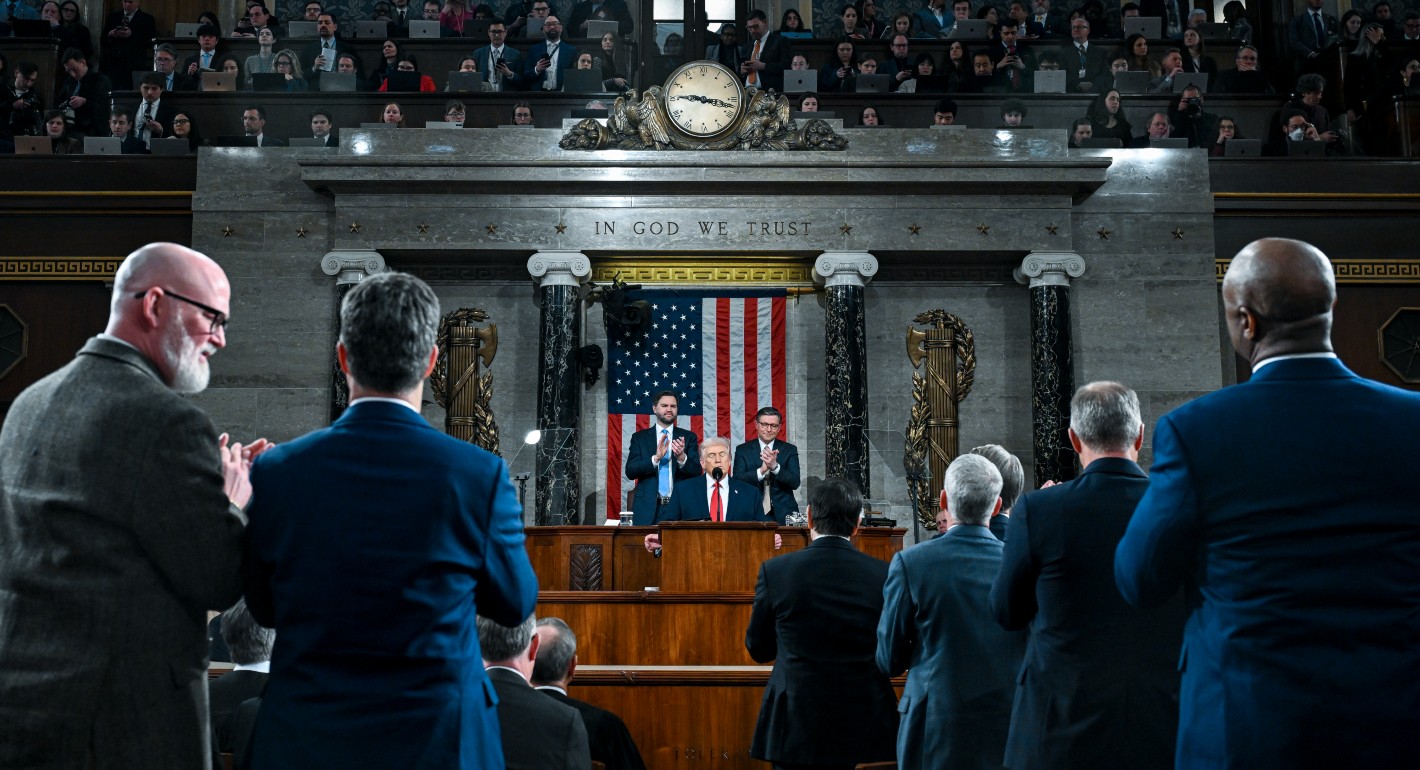- +1
Toby Dalton, Mark Hibbs, Nicole Grajewski, …
{
"authors": [
"Mark Hibbs"
],
"type": "legacyinthemedia",
"centerAffiliationAll": "dc",
"centers": [
"Carnegie Endowment for International Peace"
],
"collections": [],
"englishNewsletterAll": "",
"nonEnglishNewsletterAll": "",
"primaryCenter": "Carnegie Endowment for International Peace",
"programAffiliation": "NPP",
"programs": [
"Nuclear Policy"
],
"projects": [],
"regions": [
"Middle East",
"Iran"
],
"topics": [
"Nuclear Policy"
]
}
Source: Getty
No Board of Governors Iran Work Plan Endorsement
In his recent statement to the IAEA's Board of Governors, Iranian Ambassador Ali Asghar Soltanieh suggested that Iran is not looking to cooperate during the next stage of negotiations over its nuclear program.
Source: Arms Control Wonk

Agenda item 7(d) of this week’s routine quarterly BOG meeting wrapped up today was ”Implementation of IAEA Safeguards and Relevant UNSC Resolutions in the Islamic Republic of Iran.”
Delegates were treated to a broadside by Ambassador Ali Asghar Soltanieh suggesting that Iran isn’t about to come to Moscow in a mood to cooperate. Among other points, Soltanieh told us today:
- The IAEA is an “international technical organization” only and is acting beyond its mandate in pursuing bogus ”intelligence information” about alleged nuclear activities in member states.
- The IAEA is not really a United Nations agency at all, and therefore cannot be instructed by the Security Council to expand its mandate.
- “Involvement of the UNSC in [IAEA] matters has created a political and security dimension and prevented the [IAEA] to continue [sic] its smooth technical verification activities.”
- “The only reason that the [Iranian nuclear] file is still open is due to politically motivated allegations by a couple of Western countries.”
- The UNSC nuclear resolutions on Iran “lack… legal and technical basis.”
- Iran will never suspend its uranium enrichment program as called for by the UNSC resolutions.
In any event, Iran on a couple of points today departed somewhat from its usual narrative. For instance, this:
In order to prove to the international community that all such allegations [of military or clandestine activity] are forged and baseless and our nuclear activities are exclusively for peaceful purposes, we have on many occasions worked intensively with the Safeguards Department, and in many cases we had to take steps beyond our obligations under the NPT. The full implementation of the Work Plan (INFCIRC/711) of 2007, which was negotiated and agreeed upon by Iran and the Agency and later endorsed by the Board of Governors, proved the political determination and good will of my Government.
That’s interesting because in the background of the BOG meeting–in a development far more significant than the meeting itself–Iran and the IAEA are negotiating the final text of a proposed agreement for a new Work Plan (these days the IAEA doesn’t use the somewhat tarnished term “Work Plan” but instead calls it a “structured approach document.”)
On the eve of the BOG meeting this week, I and two Carnegie colleagues, Eli Levite and Pierre Goldschmidt, put that ongoing bilateral negotiation into context here.
On Monday this week, IAEA Director General Yukiya Amano told the BOG that the IAEA and Iran will hold a meeting here on Friday, June 8 in Vienna to negotiate further over this new text.
If Soltanieh’s statement that the BOG endorsed the original 2007 Work Plan were true, it would imply that the BOG–the same policy-making organ that has been on Iran’s case for the last nine years–approved the original Work Plan which Iran since 2008 has claimed it has fulfilled. The Soltanieh narrative might also imply that the BOG should now look with favor upon the new version of the agreement that Iran is putting forth now.
But there was no endorsement of the Work Plan by the BOG meeting in September 2007.
The 2007 Work Plan was made available to the BOG as an “information circular,” described by the IAEA Department of Publications as intended to “bring matters of public interest to the attention of its member states.”
Infcirc/711 was accordingly distributed to the BOG on August 27, 2007 in this form.
There’s nothing in the Rules of Procedures of the Board of Governors, in the IAEA publications guidelines, or to my knowledge anywhere else that says that the BOG must approve or endorse any Infcirc document.
In fact, summary records from the September 2007 BOG suggest instead that Russia, China and NAM states welcomed the Work Plan but that other member states on the BOG received Infcirc/711 without enthusiasm and, on the basis of interventions that were recorded by the president of the BOG for that meeting, by expressing skepticism. The U.S. and European states went on record at the time by warning that adoption of the Work Plan might result in Iran’s unduly prolonging the IAEA’s investigation of Iran’s nuclear program and by preventing the IAEA from addressing critical issues on the basis of evidence presented after Iran “closes the file.” These issues are still with us in the discussion between the IAEA and Iran over the new agreement draft put forth by Iran. According to some versions of events, the lack of acceptance of the 2007 Work Plan by Western states and Japan in the boardroom prompted then-DG Mohammed ElBaradei to walk out of the meeting.
When the BOG convened in September 2007, Japan’s resident representative and Ambassador to the IAEA was Yukiya Amano. (He served from September 2005 through his election as IAEA Director General in late 2009). Amano joined his U.S. and European colleagues in registering criticism of the Work Plan, on behalf of the government of Japan.
On Tuesday this week, before Iran addressed the BOG on safeguards in Iran, the 35 governors had taken up agenda item 7(b), “The Safeguards Implementation Report for 2011.” During that discussion, the Russian Federation raised objections to the IAEA’s State-Level Safeguards Approach as arbitrary and subjective. It wasn’t clear to most people why Russia made this intervention; after all, IAEA safeguards in Russia follow from a Russian voluntary safeguards offer to the IAEA (Infcirc/369) and are extremely limited in any case. Come what may, in his statement the next day inside the boardroom, Soltanieh appeared to use Russia’s statement on the SIR as a springboard, attacking the IAEA again and again for exceeding its technical mandate by indulging in arbitrary ”allegations not involving nuclear materials.”
About the Author

Nonresident Senior Fellow, Nuclear Policy Program
Hibbs is a Germany-based nonresident senior fellow in Carnegie’s Nuclear Policy Program. His areas of expertise are nuclear verification and safeguards, multilateral nuclear trade policy, international nuclear cooperation, and nonproliferation arrangements.
- Dimming Prospects for U.S.-Russia Nonproliferation CooperationArticle
- What Comes After Russia’s Attack on a Ukrainian Nuclear Power Station?Commentary
Mark Hibbs
Recent Work
Carnegie does not take institutional positions on public policy issues; the views represented herein are those of the author(s) and do not necessarily reflect the views of Carnegie, its staff, or its trustees.
More Work from Carnegie Endowment for International Peace
- What We Know About Drone Use in the Iran WarCommentary
Two experts discuss how drone technology is shaping yet another conflict and what the United States can learn from Ukraine.
Steve Feldstein, Dara Massicot
- Beijing Doesn’t Think Like Washington—and the Iran Conflict Shows WhyCommentary
Arguing that Chinese policy is hung on alliances—with imputations of obligation—misses the point.
Evan A. Feigenbaum
- Axis of Resistance or Suicide?Commentary
As Iran defends its interests in the region and its regime’s survival, it may push Hezbollah into the abyss.
Michael Young
- How Far Can Russian Arms Help Iran?Commentary
Arms supplies from Russia to Iran will not only continue, but could grow significantly if Russia gets the opportunity.
Nikita Smagin
- Trump’s State of the Union Was as Light on Foreign Policy as He Is on StrategyCommentary
The speech addressed Iran but said little about Ukraine, China, Gaza, or other global sources of tension.
Aaron David Miller












